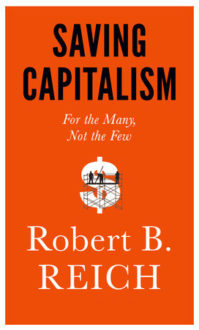 Saving Capitalism: For the Many, Not the Few on September 29, 2015
Saving Capitalism: For the Many, Not the Few on September 29, 2015 Pages: 219
Read synopsis on Goodreads
Buy the book: Amazon/Audible (this post includes affiliate links)

When I was in grad school I had to take a few economics classes and the one thing that was drilled into our heads was that, practically speaking, there’s no such thing as a free market. That’s because the market we know exists within the confines of laws and regulations. It sparked some great discussions but the concept that a free market doesn’t exist in real life makes sense. It appears Robert B. Reich agrees because that is the premise of his book, Saving Capitalism. Keep in mind the following information comes from the book and doesn’t necessarily reflect my own opinions.
The central choice is not between the ‘free market’ and government, it is between a market organized for broadly based prosperity and one designed to deliver almost al the gains to a few at the top.
Saving Capitalism: For the Many, Not the Few is a book for policy wonks but it’s approachable enough that almost anyone can understand it.![]() It’s filled with information and what I have to say just barely skims the surface of what’s covered. In it, Reich discusses how he perceives the rich to manipulate the market to their own benefit, why this is not actually in their self-interest in the long run, and outlines what needs to be done if we want to have a market, and therefore a society, that works for everyone. The book comes complete with graphs and easy-to-understand explanations of where we are in terms of wage, income, and demographic gaps and pinpoints what he thinks are the reasons for it. From the Wall Street to lobbyists to CEO pay, he offers a scathing critique of how the rich and powerful continually drive the masses downward in order to pursue their own agendas.
It’s filled with information and what I have to say just barely skims the surface of what’s covered. In it, Reich discusses how he perceives the rich to manipulate the market to their own benefit, why this is not actually in their self-interest in the long run, and outlines what needs to be done if we want to have a market, and therefore a society, that works for everyone. The book comes complete with graphs and easy-to-understand explanations of where we are in terms of wage, income, and demographic gaps and pinpoints what he thinks are the reasons for it. From the Wall Street to lobbyists to CEO pay, he offers a scathing critique of how the rich and powerful continually drive the masses downward in order to pursue their own agendas.
Take, for example, insider trading on Wall Street. This is, for all intents and purposes, illegal. But high-frequency traders get the information before the regular people do, which gives them a distinct advantage. This is not considered insider trading, it’s considered capitalizing on confidential information. Now take this concept of confidential information and apply it to CEO’s and corporate buybacks. A corporate buyback is when shareholders buy up their own stock in order to inflate the prices. ![]() Once the prices are inflated, CEO’s can cash out at the higher price and keep the profits. Although they are required to disclose that a buyback occurred, they are not required to give advance notice, so regular investors have no idea what’s going on and can’t take advantage of it in the same way that a CEO can. Reich goes on to point out that, “Between 2001-2013, they accounted for a whopping $3.6 trillion in outlays of companies in the Standard & Poor’s 500 index.” (At this point, I would like to point out that, unlike most books about our economy that I have read, this one isn’t all about Wall Street, the auto bailout, or Too Big to Fail, which was refreshing).
Once the prices are inflated, CEO’s can cash out at the higher price and keep the profits. Although they are required to disclose that a buyback occurred, they are not required to give advance notice, so regular investors have no idea what’s going on and can’t take advantage of it in the same way that a CEO can. Reich goes on to point out that, “Between 2001-2013, they accounted for a whopping $3.6 trillion in outlays of companies in the Standard & Poor’s 500 index.” (At this point, I would like to point out that, unlike most books about our economy that I have read, this one isn’t all about Wall Street, the auto bailout, or Too Big to Fail, which was refreshing).
The preferences of the average American appear to have only a minuscule, near-zero, statistically non-significant impact upon public policy.
This isn’t the only place corporations are spending a ton of money. There are also lobbying and patents, which can act as a barrier to entry to outsiders. In 2013, Apple, Amazon, Facebook, Microsoft, and Google spent more than $33 million on lobbying. As for patents, in 2012 both Google and Apple spent more money on patent litigation and acquisition than on research and development. As for Amazon, Reich has a frank discussion about their kerfuffle with Hachette (and I learned that France deems books an “essential good” which is pretty awesome).
Saving Capitalism by @RBReich is for policy wonks but is approachable for everyone. Click To TweetThen there’s the matter of poor regulation. In his book, Reich asserts that, “When an industry doesn’t want a law enacted but fears a public backlash if it openly opposes the proposed law, it quietly makes sure that there aren’t enough funds to enforce it,” citing the Food Safety Modernization Act and the Dodd Frank Act. From there, there’s also the issue of estate taxes and inheritances – “Six of today’s ten wealthiest Americans are heirs to prominent fortunes,” and Boston College Center on Wealth & Philanthropy projects that $36 trillion could be passed down to heirs in the half century leading up to 2061″. ![]() For comparison purposes, the National Debt Clock at the time of this writing is at $19 trillion.
For comparison purposes, the National Debt Clock at the time of this writing is at $19 trillion.
Never before had median household incomes dropped during an economic recovery.
This book was written last year and Reich has since endorsed Bernie Sanders for president, which is not at all surprising for two reasons. First, he points out that when wages decline, income gaps widen, and people become more hopeless, a revolution has, and will, occur. Second, he cites that “Dozens of major GOP donors, Wall Street Republicans, and corporate lobbyists told the Washington journal Politico that if the Republican Party did not put forward a candiate supportive of big business and Wall Street….. they would support Hillary Clinton. It went on to say that, “The darkest secret in the big money world of the American coastal elite is that the most palatable alternative to a nominee such as Sen. Ted Cruz of Texas… would be Clinton.”
That’s a pretty scathing criticism, depending on where you sit on the political spectrum and is also very prescient, given that many Democrats don’t view Clinton as one of their own. But regardless of who that candidate is, Reich is adamant that we need change and that, while it’s possible, both the Democrats and the Republicans are decidedly pro-business even if they don’t want to admit it. He predicts that the near-future will not consist of D’s vs. R’s, but establishment vs. anti-establishment.
So what can we do about it? Reich offers up a few recommendations. There’s talk of a minimum income, reinstating Glass-Steagall, raising the minimum wage, revising the estate and capital gains taxes, raising taxes on the wealthy, and looking behind the curtain to see what is actually happening. He believes that we need to have countervailing powers, such as unions, to stand up to big business and get us back on track. He goes on to say that debates about guns and abortion are fantastic distractions to keep everyday Americans from realizing that the market is rigged and that we need to be hyperaware and demand change. If you want to be one of those hyperaware people, whether or not you want change, then read Saving Capitalism.![]()
So who should read this book? If you like to learn things and are wondering how we got to where we are and where we are going as a country and economy, read this one.
How concerned are you about the economy?
Page sources: Corporate buybacks (p. 100-101), Lobbying expenditures (p. 22, 37), Quote re: public backlash (p. 71), D’s vs. R’s (p. 187), Quote re: Politico and ‘darkest secret’ (p. 188)














